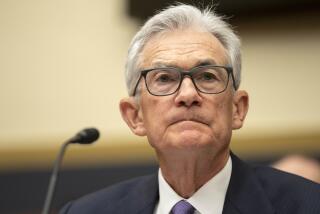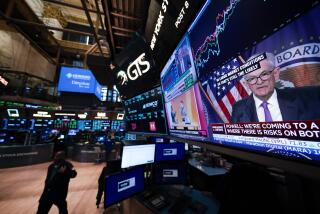Fed chief Janet Yellen expects gradual approach to rate hike
WASHINGTON — Federal Reserve Chairwoman Janet L. Yellen said the central bank was likely to take a more cautious and gradual approach toward raising interest rates than in the past, reflecting a weak economy and other risks of tightening monetary policy too quickly.
In a speech Friday in San Francisco, Yellen again signaled that economic conditions would probably prompt the Fed later this year to push up its benchmark interest rate from the near-zero level where it has been since December 2008.
The Fed chief said she expected the economy to bounce back after a sluggish start this year, with consumer spending picking up and enabling further gains in the job market.
Many analysts are predicting the first rate hike in September. But Yellen made a case for a “gradualist approach” in returning Fed interest rates to normal levels.
“The average pace of tightening observed during previous recoveries could well provide a highly misleading guide to the actual course of monetary policy over the next few years,” Yellen said at a conference sponsored by the Federal Reserve Bank of San Francisco.
One reason for the cautiousness, she said, is that the “the economy in an underlying sense remains quite weak by historical standards.” Economic growth has averaged only a little more than 2% since the Great Recession, despite super-low interest rates and other unconventional stimulus from the Fed.
“If underlying conditions had truly returned to normal, the economy should be booming,” she said.
Yellen also indicated that it would be risky to raise rates too quickly because it would leave the Fed without the ability to stimulate the economy if it were to fall back. She cited examples of premature moves made by Japan and Sweden.
“A final argument for gradually adjusting policy,” she said, “relates to the desirability of achieving a prompt return of inflation to the [Fed’s] 2% goal, an objective that would be advanced by allowing the unemployment rate to decline for a time somewhat below estimates of its longer-run sustainable level.”
The labor market has been robust, but the Fed’s main gauge of inflation has been running closer to 1%, reflecting, in part, lower energy costs and the strong dollar that has suppressed import prices.
Yellen expressed some confidence that inflation would move toward the Fed’s target as the job market continues to tighten and begins to push up real wages, which have been largely stagnant in recent years.
Although she indicated that she didn’t have to see an acceleration in wages or inflation before supporting a rate hike, Yellen noted that a reversal of those indicators would keep her from beginning the march toward tightening:
“I would be uncomfortable raising the federal funds rate if readings on wage growth, core consumer prices and other indicators of underlying inflation pressures were to weaken, if market-based measures of inflation compensation were to fall appreciably further or if survey-based measures were to begin to decline noticeably,” she said.







